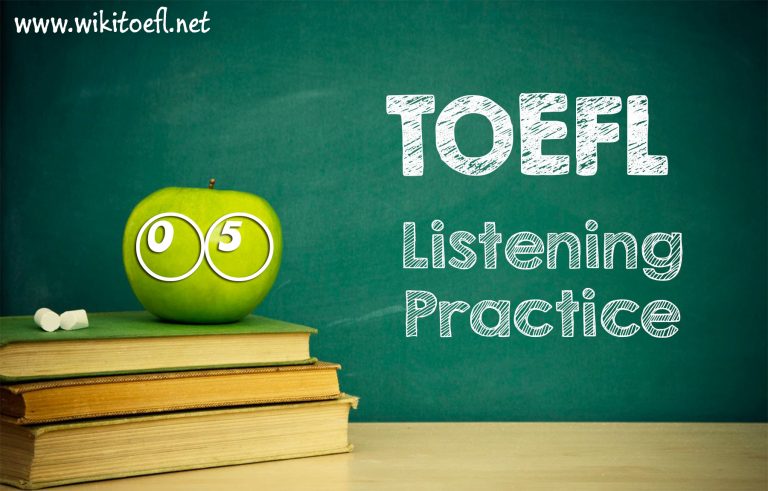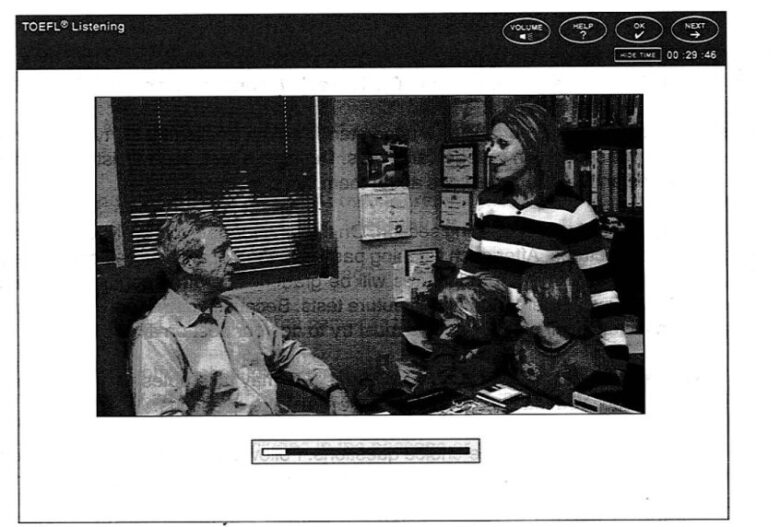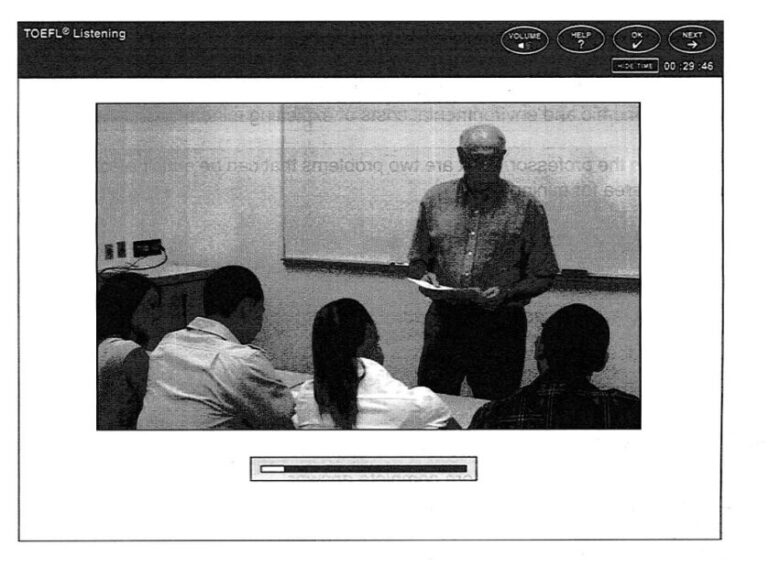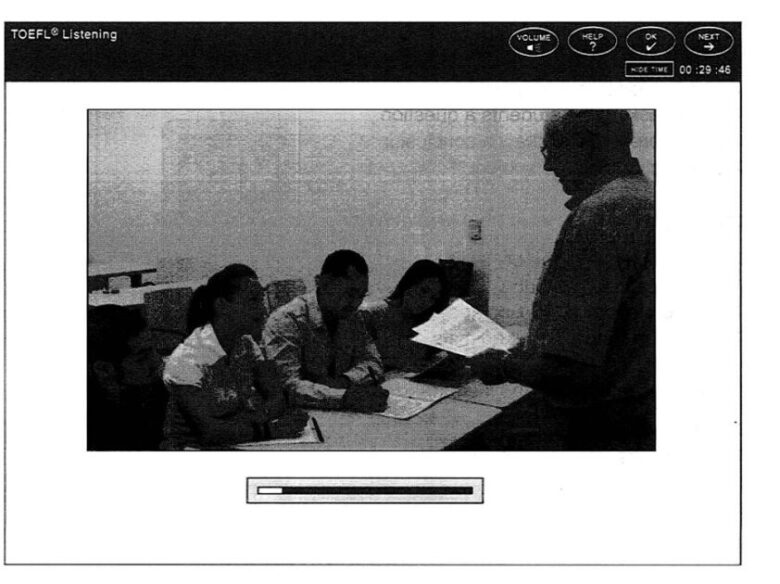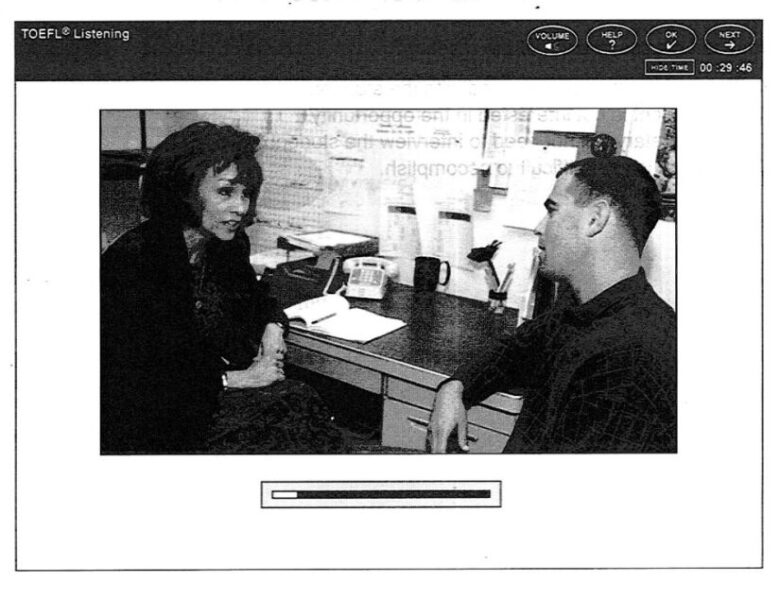TOEFL IBT Listening Practice Test 05 from Barron’s TOEFL iBT
The Listening section tests your ability to understand spoken English that is typical of interactions and academic speech on college campuses. During the test, you will listen to conversations and lectures and answer questions about them.
This is the short format for the Listening section. On the short format, you will listen to two conversations and four lectures. After each listening passage, you will answer 5-6 questions about it.
You will hear each conversation or lecture one time. You may take notes while you listen, but notes are not graded. You may use your notes to answer the questions.
Choose the best answer for multiple-choice questions. Follow the directions on the page or on the screen for computer-assisted questions. Click on Next and then on OK to go on to the next question. You cannot return to previous questions.
The Listening section is divided into sets. Each set includes one conversation and two lectures. You have 10 minutes to answer all of the questions for each set. You will have 20 minutes to answer all of the questions on the short format. A clock on the screen will show you how much time you have to complete your answers for the section. The clock does NOT count the time you are listening to the conversations and lectures.
TOEFL IBT Listening Practice Test 05 from Barron’s TOEFL iBT Part 01 Audio
TOEFL IBT Listening Practice Test 05 from Barron’s TOEFL iBT Part 02 Audio
Listening 1 “Professor’s Office
1. Why does the woman go to see her professor?
CD To get advice about memorizing information
CD To clarify several terms that she doesn’t understand
CD To get permission to bring her children to class
CD To ask a question about classroom procedures
2. What do semantic memory and episodic memory have in common?
CD They are both included in short-term memory.
CD They do not concentrate on each step in the process.
CD They are subcategories of declarative memory.
CD They are the two major types of long-term memory.
3. When the professor gives the example of riding a bicycle, what kind of memory is he referring to?
CD Declarative memory
CD Episodic memory
CD Procedural memory
CD Semantic memory
4. What does the student mean when she says this:
CD She wants confirmation that the professor understands.
CD She is worried that the professor may not be able to remember.
CD She remembers something else that she needs to say.
CD She disagrees with the professor’s example about vocabulary.
5. What does the professor suggest?
CD He wants the woman to come back to his office again.
CD He expects the woman to ask questions in writing.
CD He offers to respond to additional questions by e-mail.
CD He does not think that the woman will have more questions.
____________________________________________________
Listening 2 “Literature Class”
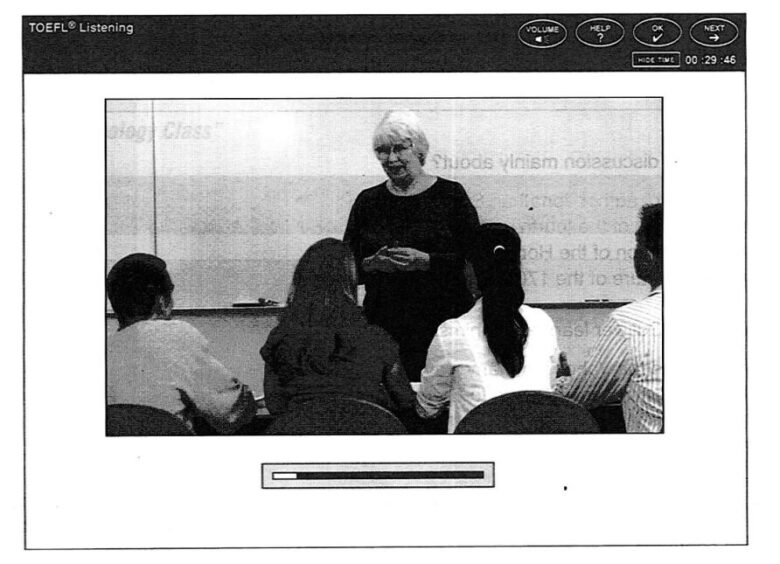
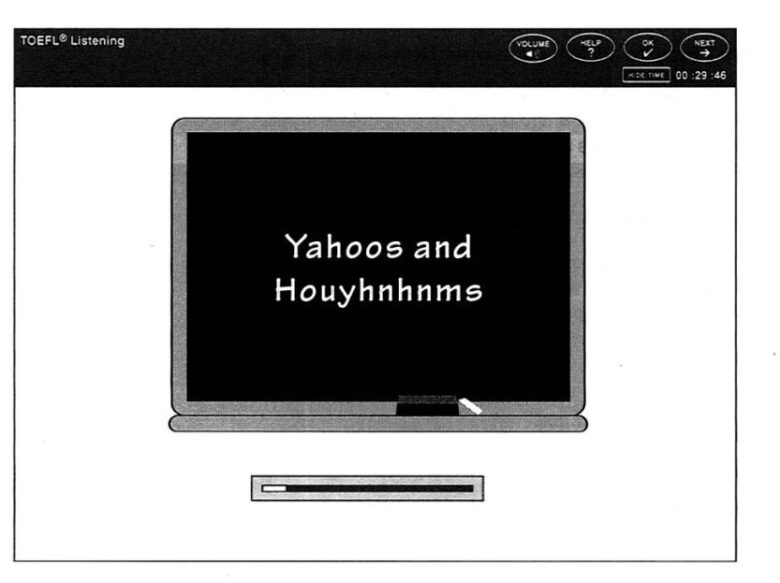
6. What is the discussion mainly about?
CD The life of author Jonathan Swift
CD A narrative of the fourth voyage of Gulliver
CD A description of the Houyhnhnms
CD The literature of the 1700s
7. What does Gulliver learn about himself?
CD He is like the Yahoos in many ways.
CD He does not want to return to England.
CD He wants to write about his experience.
CD He is afraid of the Houyhnhnm.
8. In the discussion, the professor describes the characteristics of the Yahoos. Indicate whether each of the following is one of their characteristics. Click in the correct box for each sentence.
Yes No
A. They eat flowers.
B. They have a foul odor.
C. They engage in an immoral lifestyle.
D. They are satirical caricatures of humans.
E. They live in trees.
9. Why does professor say this:
CD She is criticizing the author.
CD She is asking the students a question.
CD She is preparing to draw a conclusion.
CD She is changing the subject.
10. According to the professor, what kind of book is Gulliver’s Travels?
CD A biography of Jonathan Swift
CD A satire about mankind
CD A history of politics in England
CD A children’s story about animals
11. What can we infer about the literature of the period?
CD Satire was very popular.
CD Most books were nonfiction.
CD It copied the style of Swift.
CD The tone was not very serious.
____________________________________________________
Listening 3 “Geology Class”
12. What is this discussion mainly about?
CD How to exploit nonrenewable mineral resources
CD The exploitation of minerals in protected environments
CD Pollution as a by-product of mineral exploitation
CD The economic and environmental costs of exploiting minerals
13. According to the professor, what are two problems that can be anticipated when roads are cut into an area for mining?
Click on 2 answer choices.
A. The labor is difficult to retain,
B. The natural landscape is damaged.
C. The roadbeds create waste piles.
D. The ecosystem is disturbed.
15. What option is proposed as an alternative when all of the mineral resources in easily accessible locations have been depleted?
CD Converting to nonrenewable resources
CD Concentrating on conservation of the resources
CD Developing synthetic resources to replace minerals
CD Using new technology to search the area again
16. What does the professor imply about the environmental costs of mineral exploitation?
CD He thinks that the environmental costs are less than the economic costs.
CD He regrets that the environment is damaged during mineral exploitation.
CD He opposes mineral exploitation when it is done close to urban areas.
CD He believes in exploiting the resources in national parks and historic reserves.
17. What does the professor want the students to do in this class session?
CD Listen carefully and take notes
CD Bring in alternative ideas to present
CD Ask questions and draw conclusions
CD Prepare for a quiz at the end
____________________________________________________
Listening 4 “Professor’s Office”
18. Why does the student go to the professor’s office:
CD To change his schedule
CD To apply for a job
CD To introduce himself
CD To help the professor
19. What does the professor mean when she says this:
CD She does not want the man to be uncomfortable.
CD She thinks that the responsibilities are too difficult.
CD She is concerned that the man will be bored.
CD She is worried that the man will not try to help her.
20. What experience does the man have that may be helpful?
CD He knows how to operate the grading machine.
CD He has answered the telephone in a law office.
CD He has used computer programs for office work.
CD He has been a work-study student in another office.
21. What is the pay for the work-study position?
CD An hourly rate for sixteen hours per week regardless of the activity.
CD An hourly rate for the time spent working but not for studying.
CD A higher rate for working and a lower rate for studying.
CD A weekly rate depending on the number of hours worked.
22. What can we assume about the meeting?
CD The professor was impressed with the student.
CD The student is not interested in the opportunity.
CD The secretary will not need to interview the student.
CD The work is very difficult to accomplish.

